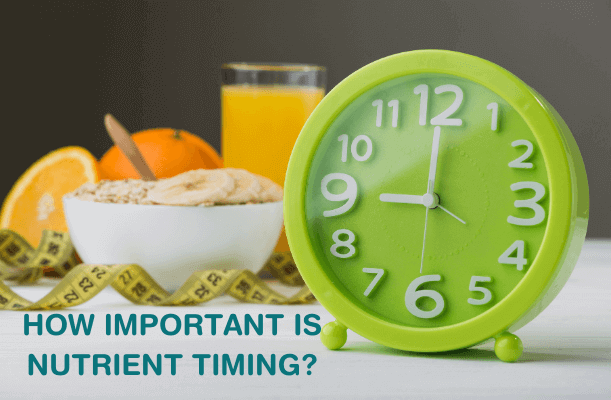Nutrient timing for athletes… When should you eat? Does it matter when you eat?
These are very common questions that I receive and the answers are different for each person because when to eat certain foods depends on the following factors:
1. Your goals
2. Your preferences
3. Your lifestyle
Nutrient Timing for Performance Nutrition. Does Nutrient Timing Matter?
When Managing Weight Does it Matter When You Eat
- Take Home Messages: How Often Should You Eat
- FAQs
- Should a normal person without any dietary goals care about nutrient timing?
- Can nutrient timing help with weight management?
- How does nutrient timing reduce injury risks in athletes?
- How many meals should you eat per day and what intervals?
- For what nutrient is timing considered most critical?
- Do all successful athletes follow strict timing for nutrition intake?
- How can nutritional timing help athletes maintain body fat levels?
- Can eating the right foods at wrong time cause nutritional deficiency?
- If you only want to eat one meal a day, what is the best time to eat it?
- How does your preferances affect nutrient timing?
 Nutrient Timing for Performance Nutrition. Does Nutrient Timing Matter?
Nutrient Timing for Performance Nutrition. Does Nutrient Timing Matter?
As a Performance Nutritionist, nutrient timing for athletes plays an important role in maximising performance and is specific to each athlete based on their sport and individual preferences.
Performance sports nutrition strategies are designed to fuel each training session and maximise recovery based on the requirements of that session whilst practising and perfecting nutrient intakes by evaluating healthy times to eat to optimally fuel competition performances.
Body composition is also vital for athletes as they need to maintain low body fat levels and high levels of muscle mass that are specific to their sport/playing position. Some athletes may need to manipulate their diet to increase muscle mass or lose body fat.
It’s also important not to forget about the health of the athlete, as the amount of physical and mental stress they put their bodies under can increase the risk of illness and injury. Nutrition plays a vital role in maintaining their health, maximising recovery and preventing injury.
What to eat and when?
With all of this in mind, eating regular meals and snacks (every 3-4 hours) that provide sufficient essential nutrients (protein, carbohydrates, quality fats, vitamins and minerals, fluids) that match an athlete’s energy levels requirements, are all important for an athlete’s health, exercise performance and body composition.
 When Managing Weight Does it Matter When You Eat
When Managing Weight Does it Matter When You Eat
On the other hand, my weight management clients who I support to improve their body composition (lose body fat and increase muscle mass), meal timing is less important, as ultimately total calories are the most important factor for fat loss, but I implement performance nutrition strategies to maximise the effects.
Does meal timing matter at all for weight management? Figuring out when to eat certain foods for weight management is very much down to the individual. Some people like to eat 2-3 times per day, others may prefer 4-6 meals per day. So long as total calories meet an energy DEFICIT (less in, more out), you will lose weight.
However, for enhancing body composition, thus losing body fat (not total weight) and maintaining or increasing muscle mass, eating every 3-4 hours may be optimal, so long as meals contain sufficient amounts of protein and are combined with regular resistance/strength training.
Take Home Messages: How Often Should You Eat
Plan your nutrition that complements your goals, preferences and lifestyle for long-term success. Nutrient timing strategies (eating at the right times) are an important factor for maximising sports performance and are not essential for fat loss so long as calories are controlled, but eating every 3-4 hours may be more beneficial for improving body composition.
For nutrition support to maximise your performance or body composition goals, get in touch for a free, non-obligatory chat to discuss how I can help you achieve them!
Get in touch via the contact page if you need help with your nutrient intake timings. Whether it’s to support your sports performance or weight management goals…I can help you find a nutrition strategy that works for you!
Also, Learn about goal setting for athletes.
FAQs
Should a normal person without any dietary goals care about nutrient timing?
Nutrient timing may matter less to a normal person than athletes. But, that doesn’t mean a normal person shouldn’t care about when they eat. Eating just once a day or continuously binge eating can negatively affect a normal person’s life as well.
Can nutrient timing help with weight management?
Yes, nutrient timing can help with weight management. However, the most important factor for weight management is calorie intake. If you want to lose weight, then you must be in a calorie deficit (burn more energy than you consume), and if you want to gain weight, you must be in a calorie surplus (consume more energy than you burn).
How does nutrient timing reduce injury risks in athletes?
Fuelling well before training and competition allow athletes to push hard to maximise performance. Underfuelling can limit this potential and, if accompanied by insufficient recovery after previous training sessions, can significantly increase the risk of injury. Protein intake is essential for the growth and repair of muscles after exercise and regularly throughout the day. If this is neglected, recovery can be impaired and potentially result in injury or loss of muscle mass.
How many meals should you eat per day and what intervals?
4-6 meals per day is a good target, which will cover these 3 main factors: 1) Effectiveness to meet daily calorie needs. 2) Evenly distributing daily protein requirements. 3) Fuelling before and recovering well after training.
For what nutrient is timing considered most critical?
Nutrient timing is most important for two kinds of people 1) Professional athletes 2) People having or recovering from serious medical conditions, e.g. Type 1 diabetics.
Do all successful athletes follow strict timing for nutrition intake?
Yes, a Performance Nutritionist will set nutrient timing for athletes to maximise their recovery, performance and training adaptations for each specific training session. They need to perform at optimal conditions consistently and maximise every marginal.
How can nutritional timing help athletes maintain body fat levels?
Athletes need to fuel at the right times to maximise their training as that’s when they need the most energy. Fuelling at the wrong times i.e. eating more calories the rest of the day can lead to increased calorie intakes resulting in higher body fat levels.
Can eating the right foods at wrong time cause nutritional deficiency?
It won’t necessarily cause nutrient deficiencies, but it may not be the optimal time to eat them for when they’re needed to maximise recovery.
If you only want to eat one meal a day, what is the best time to eat it?
Whatever time works best for you but just eating one meal a day is not recommended for athletes.
How does your preferances affect nutrient timing?
Athletes should avoid eating high fat foods before training because this will sit heavy and affect their energy levels, so these types of foods should be consumed after training so it doesn’t interfere with performance.






